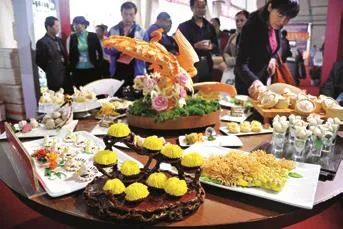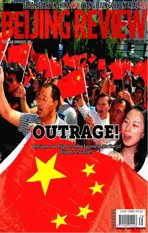THIS WEEK ECONOMY
2012-09-12
THIS WEEK ECONOMY
Fewer Limits
China’s securities watchdog has allowed overseas investors to hold a higher stake in the country’s securities firms, in its latest move to relax controls on foreign investment in the fnancial industry.
Overseas investors can now hold stakes as high as 49 percent in joint-venture securities frms, compared with the previous investment cap of a third of the companies’ equities, according to a statement issued by the China Securities Regulatory Commission (CSRC) on October 16.
At least one domestic investor should own a stake of no lower than 49 percent in such joint venture securities frms, but the restriction does not apply to listed securities frms, the CSRC said.
The policy change took effect on October 16 and came after previous steps were taken by China to further open its fnancial markets and ease restrictions on foreign investors.
In July, the country lowered its threshold for qualifed foreign institutional investors, allowing them to hold up to a 30-percent stake in a listed company, up from the previous 20-percent stake cap.
Sales Surge
China’s home appliance sales, under the country’s rural subsidy program, surged 39.4 percent year on year to 17.54 billion yuan ($2.78 billion) in September, the Ministry of Commerce said on October 17.

BETTER FOOD, BETTER LIFE Participants observe food models at the 12th China International Exhibition for Grain and Oil Products, Equipment and Technology in Jinan, capital of east China’s Shandong Province, on October 16, 2012. The three-day event attracted 1,062 enterprises from home and abroad
In the frst nine months, subsidized home appliance sales in China’s countryside rose 21.6 percent from a year earlier to 153.86 billion yuan ($25.08 billion).
As of the end of September, China had subsidized 275 million home appliance units valued at 659.76 billion yuan ($105.5 billion) since the subsidy program began in 2009.
The program, which will continue until January 2013, is part of the government’s efforts to stimulate rural consumption and buoy the nation’s economic growth amid the global economic downturn.
Under the program, farmers can receive subsidies equal to 13 percent of the price of the home appliances they buy.
Green Census
On October 16, China launched the fourth census on its environmental protection industry in order to prepare scientific data for the nation’s policymakers, according to the Ministry of Environmental Protection (MEP).
The census will cover the manufacturing of environmental protection, resource recycling and environmentally friendly products in 2011.
Services related to the environmental protection industry, including the operation of environmental protection facilities and the construction of environment-related projects, will also be included in the census.
In order to get a clearer picture of the environmental protection industry, the nation urgently needs this census, said Wu Xiaoqing, Vice Minister of the MEP.
The industry is focused on transitioning from manufacturing to services, said Wu, adding that the market had demanded higher quality and improved delivery capacity in the sector.
Similar projects were carried out in 1993, 2000 and 2004. The results of the new census are scheduled to be released in the frst half of 2013, according to the MEP.
Numbers
405.1 billion kwh
China’s total electricity consumption in September, up 2.9 percent year on year, according to the National Energy Administration.
2.76 billion yuan
The predicted third-quarter net proft of Wuliangye Yibin Co. Ltd., one of China’s top liquor makers, according to a company statement for the Shenzhen Stock Exchange.
China’s environmental protection industry has been growing rapidly in recent years.Revenues topped 1.1 trillion yuan ($175.89 billion) in 2010, according to government data.
Marine Functional Zoning
China has approved marine zonal schemes for eight major coastal regions until 2020 in an effort to enhance environmental protections.
The State Council approved plans submitted by Shandong, Fujian, Zhejiang, Jiangsu, Liaoning and Hebei provinces as well as Tianjin Municipality and Guangxi Zhuang Autonomous Region.
“Marine functional zoning provides a legal basis for effective protection of marine ecology and the environment and rational exploitation of marine resources,” read documents published by the State Council and released on October 16.
The planning of marine-related industries is required to work in accordance with the new zoning.
The documents show that 16,100 hectares in Guangxi, 33,350 hectares in Fujian and 50,600 hectares in Zhejiang are among the areas that are protected, which include mariculture, marine conservation and reserved areas. This is to ensure reasonable control of marine exploitation and guarantee fshermen’s livelihoods and the development of modernized fshery, according to the report.
The documents add that maritime regulations should be strengthened, the system of examination and approval for exploitation and sea reclamation should be strictly implemented and there should be better maritime law enforcement.
Closer Connections
A new high-speed railway was put into operation in east China on October 16, integrating cities in the country’s interior into the country’s high-speed rail network, which until now mostly covered developed coastal regions.
The new 132-km railway links Hefei and Bengbu, two cities in inland Anhui Province, cutting the journey between them by one hour to 38 minutes on a high-speed train traveling at a maximum 350 km per hour.
The section also connects to the highspeed railway between Beijing and Shanghai, and is also part of the special passenger line linked to Wuhan, capital of central China’s Hubei Province and Chengdu, capital of southwest China’s Sichuan Province.
The shortest trip from Hefei to Beijing has been cut to less than four hours after the new railway entered service. Previously, traveling by train from the capital city of Anhui to Beijing took about 10 hours.
Chinese Writers Sue Apple
Chinese writer Li Chengpeng sued Apple Inc. for selling unlicensed electronic versions of his books via its iTunes store on October 11, along with seven other Chinese writers, including Han Han, Hao Qun and Han Ailian. They demanded a total compensation of 10 million yuan ($1.6 million) from Apple for uploading their works to iTunes and selling them to readers without their permission. However, Apple argued that it was the application developers who should stand trial. It further claimed that after it deleted the works in question from the online store, there have been no violations and therefore they need not pay compensations. The plaintiffs retorted that since Apple owns and manages the App stores, it should not evade its responsibility.
Li, 44, once a soccer commentator and now a social critic and best-selling writer, has captured public attention in recent years for his humor and biting satire.

12,575 kg
The world record set by Chinese scientists in the amount of seed cotton harvested on a single hectare of land in northwest China’s Xinjiang Uygur Autonomous Region, according to the Xinjiang Academy of Agricultural Sciences.
$24 million
The loan amount Tianjin Binhai Teda Logistics, a Chinese logistics company, will receive from the Asian Development Bank, according to an announcement by the bank on October 15.
